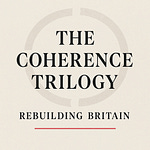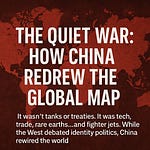On GB News, I defended a simple truth: Qatar is statistically safer than London. That isn’t an opinion, it’s data. Knife attacks, muggings, street violence, they plague London. Qatar isn’t. Sir Mo Farah acted like any father would: he moved his family somewhere safer. He shouldn’t be attacked for that. He didn’t slander Britain. He exposed what we’ve normalised.
When I said on GB News that Qatar is safer than London, I didn’t expect the statistics to be the point of controversy. Because they aren’t. They’re clear. Qatar ranks among the top three safest countries in the world, according to the Numbeo Safety Index. Street crime is negligible. Knife attacks are rare. People walk freely at night.
What stirred outrage wasn’t whether I was wrong. It was that I was right, and that, in itself, is telling. Sir Mo Farah, one of Britain’s most celebrated Olympians, decided to relocate his family to Qatar. He didn’t sneak away. He didn’t hold a press conference to slander Britain. He told the truth. He said he worried about his children’s safety. He said, “You can educate your kids, but if they’re in the wrong place at the wrong time, you see a lot of stuff happening.” That line hit me harder than anything else. Because millions of families in Britain live with that reality every day, they don’t have the option to leave.
London recorded over 450,000 crimes in the first half of 2025. That’s thousands of violent offences, knife attacks, muggings, thefts, every single day. It’s become routine. We flinch when a child is stabbed on their way home from school, but we no longer act surprised. We demand more policing, but we cut neighbourhood officers. We talk about rights, but we quietly accept that our streets are ruled by fear, and then, when someone chooses to leave, we shame them.
When Farah said Qatar is safer than London, the response wasn’t to fix London. It was to attack Qatar or to attack him. My co-panellist Nayak Gabbani, for the record, I have no idea who he is, apart from the introduction as an Iranian dissident, never spoken to him before the segment, and could find nothing on him anywhere, but, I’ll keep looking (more on that later), asked, “Would you say Iran is safer?” “What about the UAE?” As if that’s a logical rebuttal. It isn’t. It’s a distraction. Iran is not safer than London. That’s not a serious argument. And the UAE? In many ways, yes, it is safer. But that wasn’t Mo Farah’s choice. He chose Qatar. And the focus should be on why.
I was abundantly clear that Qatar’s safety comes at a cost. Freedom. Protest rights. Civil dissent. It is not a liberal democracy. But here’s the uncomfortable truth: safety and liberty are no longer guaranteed side by side in Britain either. We like to tell ourselves that we’ve struck the right balance. That our freedom is protected. But freedom without public order is theatre, and too many British families today are living in fear, not liberty.
Gabbani, when asked by the host who he blamed, launched into the predictable. In the most explosive moment of the exchange, he replied:
"Yeah, migrant. Migrants. The Islamists. The Islamists and leftists who brainwashing, they are washing the leftist brain, and they are making [London dangerous]."
He went on to claim, when asked where are they coming from:
"They coming from Middle East, they coming from Africa, they coming from all around the world, they washing their brain. There was no crimes before immigrants were there…"
This was the moment the conversation tipped from commentary into caricature, for me, so I wanted to be absolutely clear and had to confirm what I’d heard. I asked: “There was no crimes before immigrants were there, is that what you're saying?”
He doubled down: “Absolutely, absolutely.”
I responded with a direct challenge: “There were no crimes in London specifically before the immigrant population arrived? So you're talking about the Irish, the Jews, the pagans that were there before them centuries ago? What’s your timeframe of what you're comparing here?”
I wasn’t going to let historical revisionism slide. London has always had crime. Gangs didn’t arrive with immigrants. Victorian London had opium dens and pickpockets. Pre-war London had fascist brawls in the street. It wasn’t migration that created chaos; it was the state’s retreat, the gutting of community services, and the vacuum that allowed criminal economies to thrive. Pretending otherwise is either ignorance, amnesia, or dishonesty. His rebuttal revealed the selective memory and racial coding underlying his argument.
Yet Gabbani’s argument didn’t stop there. After blaming Islamists and leftists for brainwashing the country, he made an even more bizarre claim: that “there is no Islamists in the Middle East.” It was a staggering contradiction. Moments earlier, he had said, “They coming from the Middle East, they coming from Africa, they coming from all around the world.” So which is it?
Whether he realised it or not, what he was implying is clear: that Islamist elements have been expelled from their home countries and have taken root in Britain, specifically London, making it dangerous. It’s the fantasy of Britain as a dumping ground for everyone else’s worst elements.
But the facts don’t support this narrative. Yes, regimes in the Middle East have cracked down on some Islamist movements, some brutally, but that doesn’t mean those ideologies don’t exist there. And more to the point, ideological extremists do not drive London’s crime crisis; it’s driven by postcode poverty, criminal neglect, and the erosion of public infrastructure.
His logic fails the basic test of reality. It wasn’t “Islamists” turning off the street lights, closing youth centres, or gutting community policing. That was done by the state, here at home.
Gabbani tried to pivot the conversation away from street-level crime and safety to geopolitics, throwing in the claim that Qatar funds terrorists and supports Hamas. I cut through the noise. “We’re talking about domestics here,” I said flatly, “not about international affairs.” He was grasping. So I brought it back to the data. “Street crime hardly ever happens. That’s why he packed his bags.” Whether or not you like Qatar’s foreign policy is irrelevant to the fact that on the streets, where kids walk to school and families try to live in peace, it’s safer than London. I didn’t entertain his smear of Sir Mo Farah, even though arms-length, even unintended association with terrorism, and clarify, “Mo Farah is not a terrorist,” because it wasn’t serious.
I kept it on the numbers. “You can argue with the numbers, whether they’re right or wrong, but that’s the reason he left. And if he’s willing to pay the price for that safety, that’s his choice.” Gabbani tried to make it a foreign policy debate; I made sure we stayed focused on lived reality.
In the final stretch of the debate, after Gabbani referenced a recent report “from the Parliament… saying the IRGC made a plan actually to threaten the Iranians,” the conversation lurched from local safety to a full-blown geopolitical spiral. It was a legitimate concern; he should feel safe here. Every dissident should. But then came the moment where clarity collapsed. Between claims about terrorism, Islamist influence, and his assertion that “the Islamists washing the leftist brain,” I thought I heard him veer into absurdity—suggesting, perhaps unintentionally, that Israelis might soon say Gaza is safer than London. I paused and asked plainly: “Did you just say Gaza is safer than London?” To confirm, not to corner him. He didn’t correct it. He didn’t explain. He let it hang.
Even the host, midway through the segment, attempted to inject reason, saying he would choose to raise his children in the UAE, "simply because it's safe and it's a decent place to raise children.” Gabbani replied: “Absolutely yes.” Yet, for reasons only he can explain, he had spent the entire segment rejecting that same logic when applied to Qatar. The exchange slipped from serious concern into satire.
What began as a serious exchange about safety, statistics, and lived realities had spiralled into abstraction and provocation. The host, who to his credit was balanced, called time before it unravelled further. But had we continued, I’d have swept the floor with more than statistics. I was only getting started.
The truth is this: Sir Mo Farah didn’t betray Britain. He opted out of a broken promise. He used the one luxury that working-class families don’t have a choice. He chose to raise his children somewhere he believes they’ll be safe, and the fact that he had to choose at all? That’s the real indictment. When safety becomes a privilege instead of a right, we have failed as a society.
Qatar isn’t perfect. But it keeps its streets safe. In London, even that is up for debate. So the next time someone leaves, don’t ask why they went. Ask what we did to make staying feel dangerous. When families start choosing order over freedom, it means the freedom on offer was already hollowed out. When a gold medallist, knighted by the Crown, decides Britain can’t protect his kids, we’d better stop laughing and start listening.
Javed Bashir is the founder of the Independent Coalition, a former UK parliamentary candidate, and a trustee of the John Stuart Mill Institute. Known for his incisive commentary and refusal to toe the party line, Bashir writes on state power, public failure, and the need for a political reckoning. His work exposes the comfortable lies of Westminster and pushes for a democratic realignment rooted in accountability, not allegiance.
The Independent Coalition exists to confront the political dishonesty that twists statistics and weaponises problems. We believe in solutions grounded in fact, not fear, truth, not tribalism. We fight for housing, safety, and public trust without scapegoating those with the least.
We’re offering what no other party dares: honesty without spin, security without excuses, and a future where safety is a right, not a postcode lottery.
— Javed Bashir, Founder, Independent Coalition
📍 thecampaigngroup.uk
📌 www.javedbashir.org.uk
🐦 @realJavedBashir









